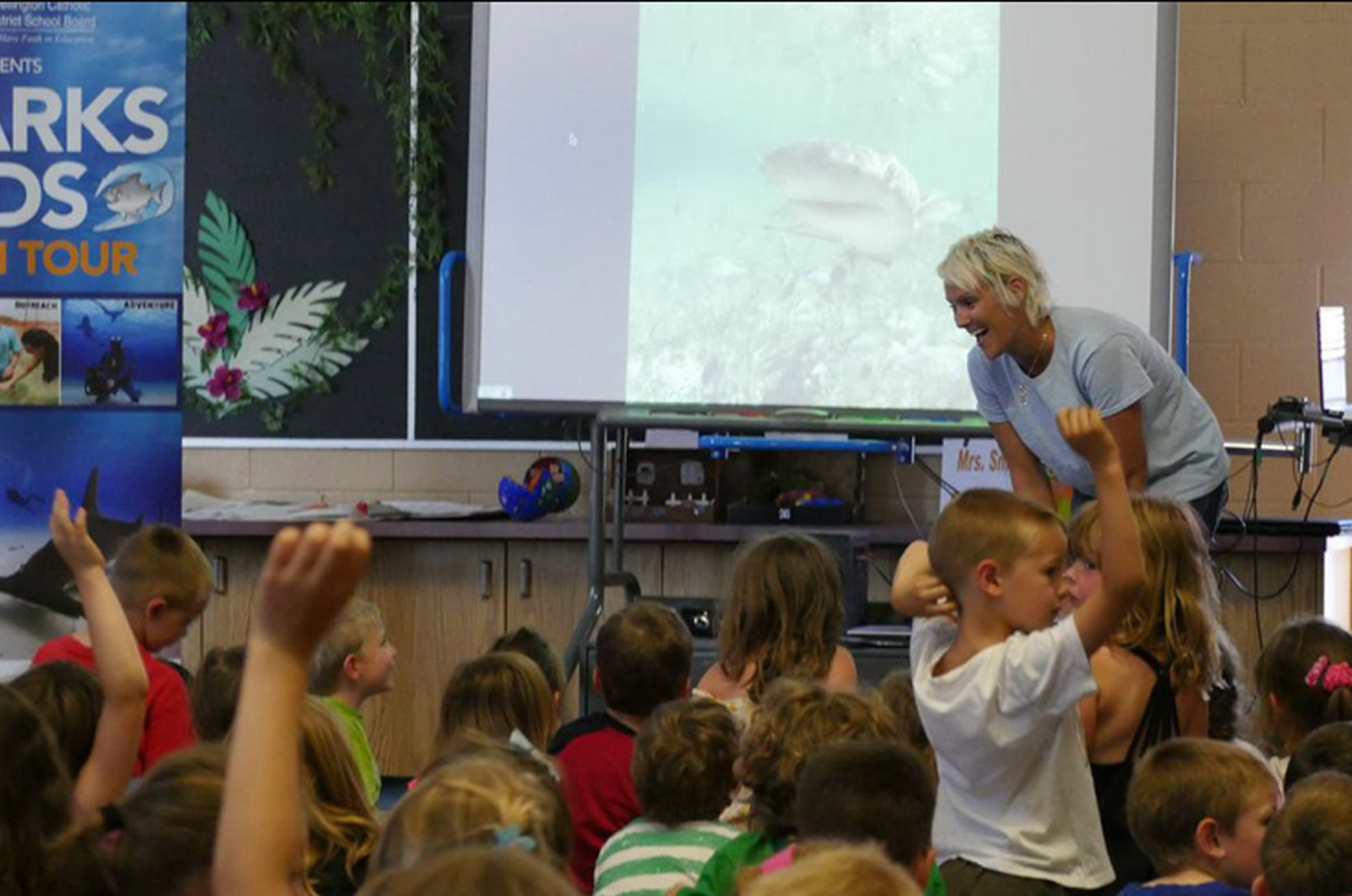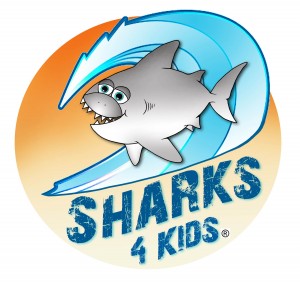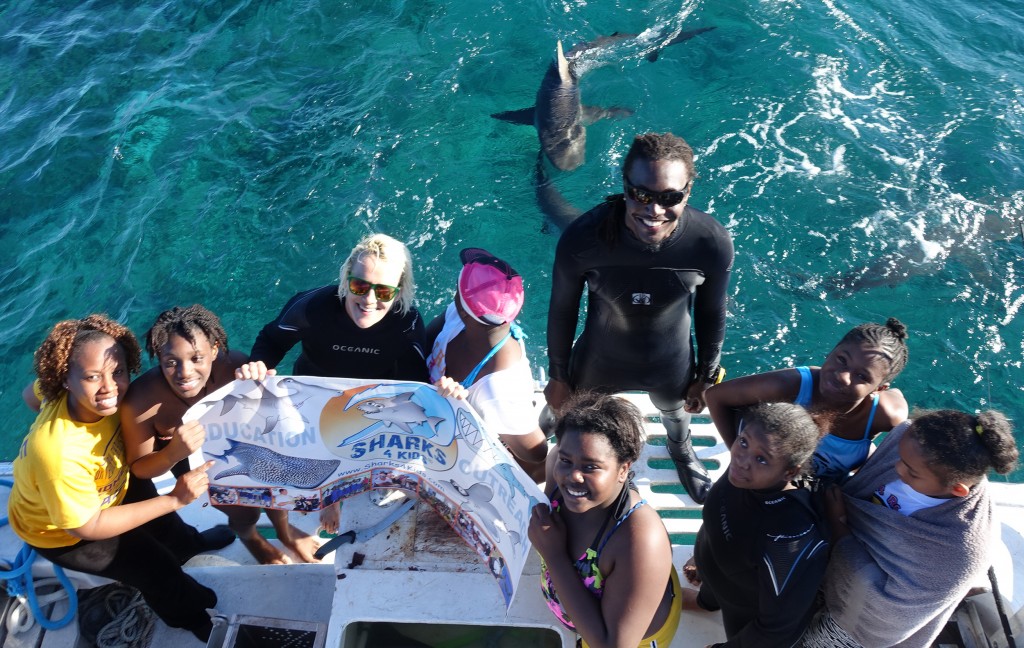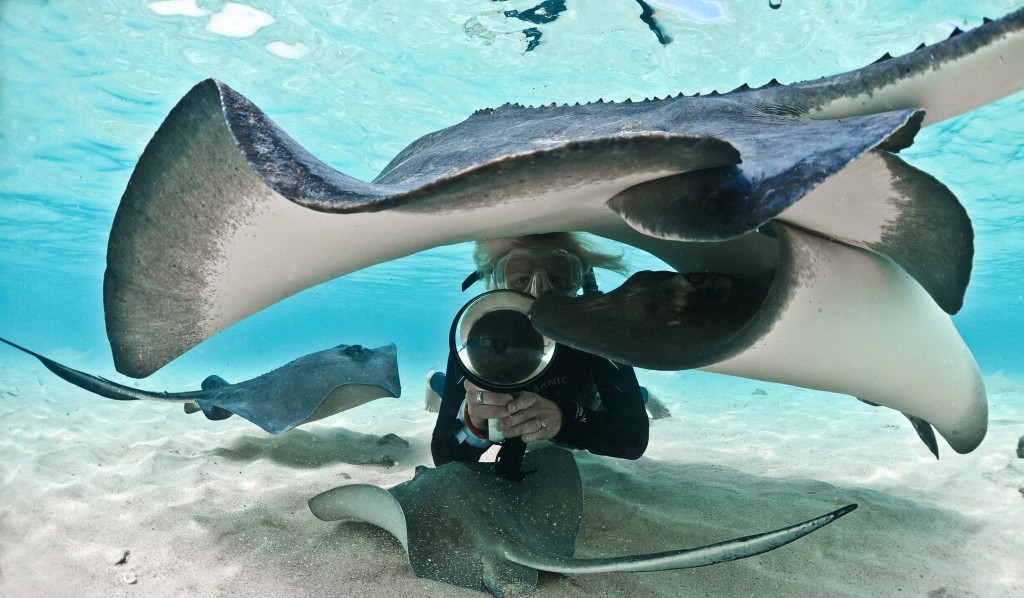Marine Life & Conservation Blogs
Sharks4Kids

 On a recent trip to Bimini, in the Bahamas, we had the chance to meet Jillian and Duncan. They are talented underwater photographers and videographers with a particular passion for sharks. We met on a dive boat, heading out to dive with Great Hammerhead sharks, and chatted about their charity, Sharks4Kids, about shark conservation and our joint passion for shark imagery. We asked Jillian to tell us a little more about what she does.
On a recent trip to Bimini, in the Bahamas, we had the chance to meet Jillian and Duncan. They are talented underwater photographers and videographers with a particular passion for sharks. We met on a dive boat, heading out to dive with Great Hammerhead sharks, and chatted about their charity, Sharks4Kids, about shark conservation and our joint passion for shark imagery. We asked Jillian to tell us a little more about what she does.
Tell us about Sharks4Kids. What does it do now and what you hope to be able to achieve in the future?
Sharks4Kids is a US based non-profit with the goal of creating the next generation of shark advocates through education, outreach and adventure. Founded by a team of marine biologists, videographers and photographers, Sharks4Kids is able to combine science and conservation media to create a unique and dynamic range of shark education materials. The website offers curriculum, videos, activities and more. Skype classroom lessons and Google hangouts also offer teachers and students the opportunity to have an interactive experience with shark scientists and conservationists. Using Skype, the team has connected with over 40,000 students in 37 countries and 47 US States. Our shark education tours have been hosted in Canada, The Bahamas, The United States and the Dutch Caribbean. In person visits have taken our team to 7 different countries and our ambassador program is building. Shark snorkels, dives and tagging trips are also offered as a way of immersing students into the world of sharks and shark science. We will be publishing our first children’s book in April and will have our first app available later in the year.
Sharks4Kids hopes to expand and increase field opportunities, develop more interactive video content and continue to build the next generation of shark advocates around the world.
Tell us a little about yourself, why you love sharks, and how you got involved in shark conservation.
I grew up crawling through tide pools on the Maine coast and swimming in the cold ocean water until my lips turned blue, much to my parents’ dismay. By the time I was 8 years old, I had seen dolphins, manatees and sharks in the wild and my attachment to the ocean became even deeper. I knew from that young age, the ocean was my place and would be a large part of my life. This passion and fascination has only intensified as I’ve gotten older and much of my adult life has revolved around the ocean.
After graduating with a degree in animal behavior I began traveling the world to study sharks, which took me to Florida, The Bahamas, California and Australia. During my travels my love of sharks and want to help conserve them only grew. I realized how much fear and even hatred was associated with these animals and my own experiences were polar opposites of that. I knew I wanted to share their story and help people understand their reality versus the stereotypes and so began a journey to spread shark education and awareness.
I created Sharks4Kids, Inc. in 2012 because I believe kids offer hope for our oceans and for our planet. Their voice can be heard. When given tools, the opportunities for students around the world to make a difference, is endless. They have beautiful visions, stories to tell and creative, unbiased minds to drive action. No matter how young or old, never underestimate your ability to influence, inspire and empower.
I have traveled the world filming and photographing marine life, especially sharks. Perceptions and attitudes are changing, directly propelled by someone’s glimpse into the life of these misunderstood predators. Education and awareness develop understanding and compassion, all of which can be catalyzed by one simple image.
Why are great underwater images and video important to the great work that you do at Sharks4Kids?
It is probably cliché to say, but a picture is really worth a 1000 words and can tell a very powerful story. Showing people the beauty and grace of these animals can replace fear with fascination. Images can also catalyze a curiosity for someone to have their own experience. They allow us to show diversity, adaptations, behaviors, habitats and threats facing sharks. They can also help us learn a tremendous amount about a particular shark or a species. We can also show people in the water with sharks, which is also a powerful tool. Sharks are wild animals and they must be respected, but they are not the man-eating monsters they are so frequently portrayed as. Photos and videos are an invaluable tool for teaching kids around the world about sharks, why they are important and how they can help save these incredible animals.
For more information, visit www.sharks4kids.com.
Blogs
Saba’s Plan for a Coral Comeback

Saba has an exciting new initiative to restore its coral reefs. This new project, running from 2024 to 2026, will focus on reviving key species in the island’s underwater ecosystems. With a collaborative team from the Saba Conservation Foundation (SCF) and Van Hall Larenstein (VHL) University of Applied Sciences, the project aims to restore both corals as well as sea urchins.
This initiative is centered around coral restoration, specifically reviving two essential coral species—staghorn coral (Acropora cervicornis) and elkhorn coral (Acropora palmata). By mapping parent colonies and using a technique known as coral gardening, SCF will create and maintain coral nurseries. These corals will eventually be outplanted at key reef sites around Saba to not only expand the number of coral colonies, but also provide essential fish habitat. The project focusses on installing coral nurseries, training staff with the newest techniques and starting with the restoration of key reef sites.

Reef Cleaners to the Rescue
It’s not just corals getting a makeover—this project also shines a spotlight on the essential role of grazers, particularly sea urchins. VHL is leading the charge on cultivating and restocking two key sea urchin species, West Indian sea egg (Tripneustes) and long-spined sea urchin (Diadema), known for their ability to keep algae in check. By removing algae, which are important competitors of corals, they help the coral to thrive. By restoring these “reef cleaners,” Saba’s project will give corals the breathing room they need to grow, setting the stage for a healthier, more balanced marine ecosystem.
From Tiny Urchins to Big Goals
The project will be funded as part of the Dutch Government’s Nature and Environment Policy Plan (NEPP) 2020-2030 for the Caribbean Netherlands, a comprehensive initiative aimed at conserving and restoring the unique natural environments of the Dutch Caribbean islands, including Saba, St. Eustatius, and Bonaire. This project is aiming for big milestones: build and maintaining coral nurseries, the expansion of urchin cultivation facilities, and the creation of a dedicated research center. By 2026, the project hopes to ramp up coral and grazer restoration, with the ultimate goal of extending these efforts across the Dutch Caribbean. By linking local initiatives to broader regional goals, Saba’s restoration project promises to leave a lasting impact on both the environment and the community.
Find out more about the DCNA at dcnanature.org.
Blogs
Reef-World marks two decades of marine conservation: strengthening impact amid coral reef threats

Empowering ocean stakeholders to tackle future challenges and ensure the survival of coral reefs and humanity
2024 marks the 20th Anniversary of The Reef-World Foundation’s tireless efforts for global coral reef conservation. The UK charity is the international coordinator of the UN Environment Programme’s Green Fins initiative, known as the leading voice in sustainable marine tourism. Today, Reef-World released its 2023-2024 Impact Report outlining a year of substantive growth and impact in its marine conservation programmes.

Impact Report Highlights:
- Impressive improvements in environmental behaviours to protect coral reefs by the marine tourism industry as the global participation of Green Fins increases.
- Continued capacity building for government and NGO staff to effectively manage marine tourism activities in Asia, Caribbean and Red Sea regions.
- For the first time in Green Fins’ 20-year history, tourism operators have achieved ‘Best Environmental Performer’ status by demonstrating the lowest possible environmental impact in their environmental assessments. In 2024, three dive operators achieved this challenging milestone.
- Significant increases in global participation of Reef-World’s innovative digital conservation tools.
- 138 Green Fins dive operator members achieved the strict threshold for PADI Eco Center recognition.
- Developed four new educational materials and translated two into 16 languages to support the marine tourism industry in achieving sustainability targets.
- Establishing a new Reef-World Development strategy and recruiting new roles – Development and Programmes Managers.
- Reef-World’s board welcomes new Chair and Trustees strengthening organisational leadership.

Reef-World started as a one-person mission to inspire and empower communities to act in conserving and sustainably developing coral reefs and related ecosystems. Today, the team of 12 continues to meet this mission by inspiring and empowering the global marine tourism community to be exemplary sustainability leaders by using the Green Fins guidelines and tools to simultaneously use and protect the world’s precious reefs.
In April 2024, the fourth global coral reef bleaching event was confirmed. Reef-World’s work has never been more urgent as the marine environment, and the benefits they provide humanity, continue to be eroded by global threats. The reduction of local threats, like those from the marine tourism industry, is an essential step to ensuring a future where coral reefs survive and continue to support the millions of people who depend on their ecosystem benefits. Reef-World’s work buys time for coral reefs and related ecosystems to be resilient to the impacts of global threats.
“Right now our corals are facing the greatest fight of their existence as the terrifying predictions of the steps towards their complete extinction are starting to come true. But all is not lost, reefs are resilient and they have existed on this planet for millions of years. We must take action now, to buy time for reefs by reducing threats facing them and allowing them to react and adjust to the changing environment they need to survive in.” – Chloe Harvey, Executive Director
Looking Forwards:
Like coral reefs, the Reef-World team needs to be resilient in the face of the complex challenges of the conservation sector. Reef-World has invested significantly in developing a Culture of Care to ensure the well-being of its team on a daily basis, continuing to be an exemplary employer to enable its team to best achieve the mission for coral reef conservation.
With the foundations of a Culture of Care and organisational development laid, Reef-World is emerging from the end of a natural organisation life cycle, that brings the challenges of growth and scale, stronger than ever. With a new strategy in place to generate much needed resources, Reef-World is excited for the opportunities to leap forward, continue to scale our impact and lean into new innovations and untapped opportunities for marine conservation.
We continually strive to become a forward-thinking organisation that delivers on our goals and commitments to our stakeholders with fresh approaches and not being afraid of steering away from a “normal approach.” This approach is not only applied to our programmes of work but also internally and carries over to our Culture of Care for our team.” — JJ Harvey, Operations Director

The Reef-World Foundation is immensely grateful for the continued support of its grant funders: UN Environment Programme, IUCN’s Blue Natural Capital Financing Facility, Adventure Travel Conservation Fund, PADI Aware Foundation, and World Nomads Footprints Program.
Reef-World would also like to express its gratitude to international partners whose vital support has resulted in significant tangible benefits for our work and mission: PADI; Professional SCUBA Schools International (PSS); Explorer Ventures; 1% for the Planet; ZuBlu; Snorkel Venture, GSTC; Dive O’Clock; Seven Dragons; DiveAssure and Eco Beach, without whom these achievements would not be possible.
The full 2023–2024 Annual Impact Report is available on Reef-World’s website.
-

 News2 months ago
News2 months agoIconic SS United States to become the World’s Largest Artificial Reef
-

 News3 months ago
News3 months agoBook Review – 52 Assignments: Underwater Photography
-

 Gear News3 months ago
Gear News3 months agoDYNAMICNORD – New German diving brand enters the British market
-

 News3 months ago
News3 months agoExploring Cenote El Pit: A Diver’s Dream
-

 Gear News3 months ago
Gear News3 months agoTry BARE drysuits (and maybe even win one!) this Friday with Sea & Sea at North West Dive Fest
-

 Marine Life & Conservation3 months ago
Marine Life & Conservation3 months agoBook Review: Coral Triangle Cameos
-

 Blogs2 months ago
Blogs2 months agoDive the Egyptian Red Sea this Autumn with Regaldive
-

 News3 months ago
News3 months ago2024 Ocean Art Underwater Photo Competition Announced

















